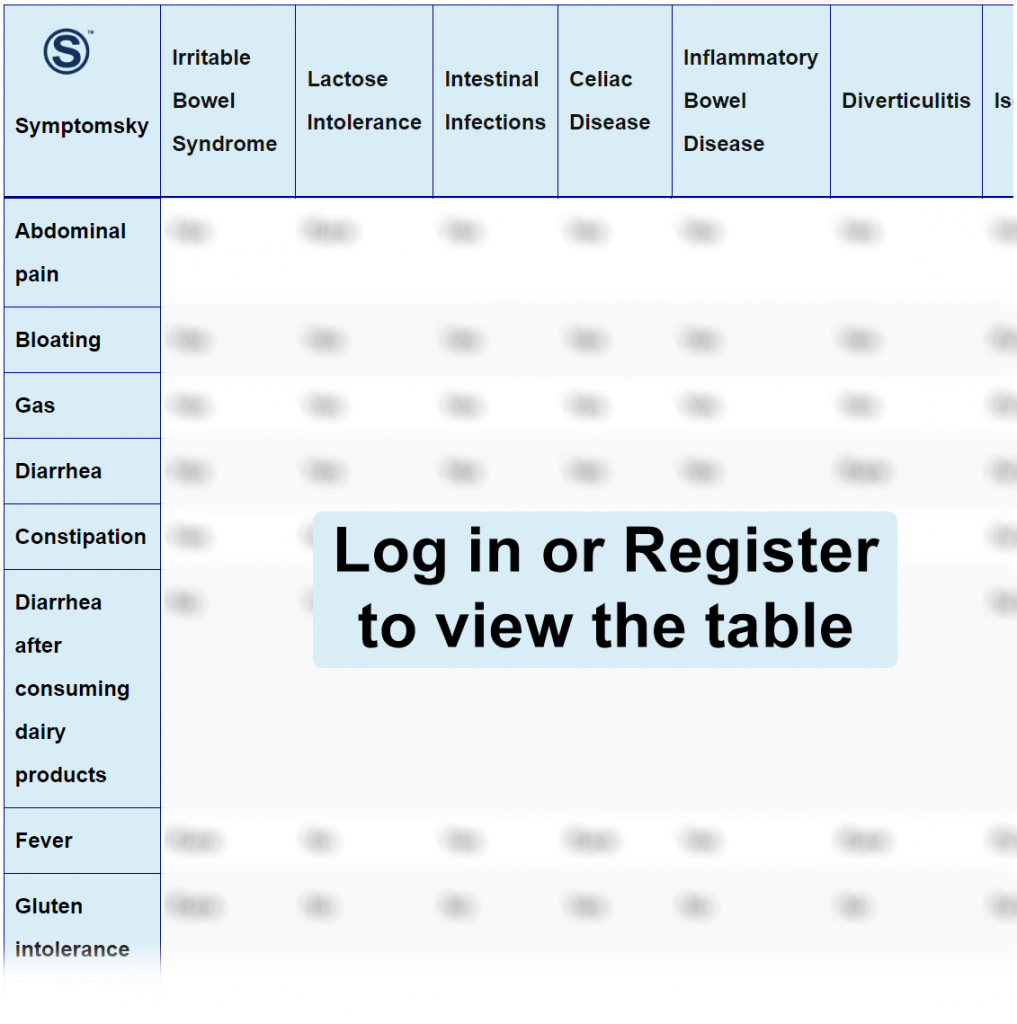Contents
- 1 Irritable Bowel Syndrome Differential Diagnosis Table:
- 2 How to Distinguish Irritable Bowel Syndrome from Other Diseases
- 2.1 Distinguish Lactose Intolerance from Irritable Bowel Syndrome – Diagnosis
- 2.2 Distinguish Intestinal Infection from Irritable Bowel Syndrome – Diagnosis
- 2.3 Distinguish Celiac Disease from Irritable Bowel Syndrome – Diagnosis
- 2.4 Distinguish Inflammatory Bowel Disease from Irritable Bowel Syndrome – Diagnosis
- 2.5 Distinguish Diverticulitis from Irritable Bowel Syndrome – Diagnosis
- 2.6 Distinguish Ischemia from Irritable Bowel Syndrome – Diagnosis
- 3 Irritable Bowel Syndrome Complications and Treatments
Irritable Bowel Syndrome Differential Diagnosis Table:

IBS is a chronic condition associated with abdominal pain or discomfort and altered bowel habits. Irritable bowel syndrome causes diarrhea, constipation or both.
Irritable bowel syndrome is experienced as flatulence, distention, abdominal pain, altered bowel movement and frequency (diarrhea, constipation or both). IBS is diagnosed by Rome Criteria, in addition to patient’s history, physical examination and laboratory tests such as CBC.
Irritable bowel syndrome is a lifelong condition that negatively impacts patients’ quality of life and is irritating. IBS cause is known, but found to be linked to stressful life events, mental disorders, bad dietary habits, and bacterial infection in the digestive tract.
How to Distinguish Irritable Bowel Syndrome from Other Diseases
Distinguish Lactose Intolerance from Irritable Bowel Syndrome – Diagnosis
- Lactose intolerance manifestations are associated with diarrhea only 30 min to 1-2 hrs after dairy ingestion, while IBS is a chronic condition associated with diarrhea, constipation, or both.
“Lactose intolerance test is used for differentiation.”
Distinguish Intestinal Infection from Irritable Bowel Syndrome – Diagnosis
- Intestinal infection is associated with fever, unlike irritable bowel syndrome which is not associated with fever.
- Intestinal infection diarrhea is bloody or watery in dysentery, while Irritable bowel syndrome can be normal diarrhea or constipation.
- Signs of dehydration such as dry mouth, tachycardia, hypotension, and decreased skin turgor are present in intestinal infection, while absent in irritable bowel syndrome.
“Stool culture for pathogens is used for differentiation.”
Distinguish Celiac Disease from Irritable Bowel Syndrome – Diagnosis
- Celiac disease is associated with gluten ingestion, while Irritable bowel syndrome is not associated with gluten ingestion.
- Celiac disease is only restricted to diarrhea, while irritable bowel syndrome involves diarrhea, constipation or both.
- Celiac disease involves lethargy and recurrent mouth ulcers, unlike irritable bowel syndrome where lethargy and mouth ulcers are absent.
“Serology, genetic, and blood tests are used for differentiation.”
Distinguish Inflammatory Bowel Disease from Irritable Bowel Syndrome – Diagnosis
- Inflammatory Bowel Disease is associated with bloody diarrhea, while Irritable bowel syndrome is associated with normal diarrhea.
- Inflammatory bowel disease abdominal pain is localized in the left quadrant, while irritable bowel syndrome pain is generalized.
- Inflammatory bowel disease involves tenesmus and severe urgency, while Irritable bowel syndrome is not associated with these signs.
“Colonoscopy in addition to inflammatory laboratory markers are used for differentiation.”
Distinguish Diverticulitis from Irritable Bowel Syndrome – Diagnosis
- Diverticulitis is not associated with diarrhea or constipation, unlike Irritable bowel syndrome where diarrhea or constipation are crucial for diagnosis.
- Diverticulitis pain is localized in the lower quadrant, while irritable bowel syndrome pain is generalized.
“CT scan is used for differentiation.”
Distinguish Ischemia from Irritable Bowel Syndrome – Diagnosis
- Ischemia is not associated with diarrhea or constipation, while diarrhea or constipation are crucial symptoms in irritable bowel syndrome.
- Ischemia involves severe sudden pain and can be accompanied by rectal bleeding, while Irritable bowel syndrome does not involve these symptoms.
“Angiography and imaging tests are used for differentiation.”
Irritable Bowel Syndrome Complications and Treatments
Irritable Bowel Syndrome usually does not have complications, but patients should seek emergency care in the following cases: severe weight loss, rectal bleeding, unexplained vomiting, diarrhea at night, and iron deficiency anemia.
Irritable bowel syndrome treatment is symptom-based. Treatment is pharmacological and non-pharmacological. Pharmacological treatment is based on symptoms. In constipation, fiber supplements and laxatives are considered. In diarrhea, loperamide or probiotics are considered. In constant-chronic IBS, low-dose TCAs or SSRIs are considered. Non-pharmacological treatment such as diet modification and physical activity. Increased physical activity is found to increase colonic transit time and symptom improvement.
